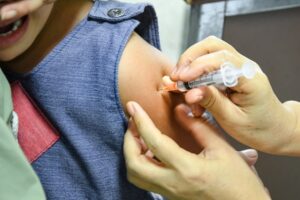The COVID-19 pandemic cost at least seventeen million children routine vaccinations, recent research from The Lancet shows. According to the research, “routine immunisation services faced stark challenges in 2020, with the COVID-19 pandemic causing the most widespread and largest global disruption in recent history.”
Senior author and Assistant Professor from the Institute for Health Metrics and Evaluation (IHME) at the University of Washington’s School of Medicine, Jonathan Mosser, sat down with Health Issues India, for a 42-minute interview to discuss the findings of the study. Explaining the figures, Mosser told me “our study estimates that global vaccine coverage in 2020 may have dropped by 7.7 percent for the third dose of the diphtheria, tetanus pertussis vaccine and by 8.9 percent for the first dose of the measles vaccine compared to what would have been expected had there been no pandemic.
“This will translate into an additional 8.5 million children who missed the third dose of the diphtheria, tetanus pertussis vaccine and 8.9 million children who missed the first dose of the measles vaccine in 2020. Our models suggest that every region of the world, including high-income countries, saw reductions in coverage, particularly in March and April, although for many reasons, there were signs of recovery in the latter part of 2020.”

India took a hit in terms of routine vaccinations, as my colleague Nicholas Parry covered for Health Issues India recently . “An estimated 3.5 million children missed out on their first dose of diphtheria-tetanus-pertussis combined vaccine (DTP-1) in India in 2020,” he wrote. “Three million more children missed their first dose of the measles vaccination. Such were the effects of the initial wave of the COVID-19 pandemic that health systems across the globe were thrown into disruption. Diseases such as polio, the closest disease worldwide to being eradicated, were threatening a resurgence as vaccination campaigns were suspended.”
“Even as countries clamour to get their hands on COVID-19 vaccines, we have gone backwards on other vaccinations, leaving children at risk from devastating but preventable diseases like measles, polio or meningitis,” said Dr Tedros Adhanom Ghebreyesus, World Health Organization (WHO) Director-General. “Multiple disease outbreaks would be catastrophic for communities and health systems already battling COVID-19, making it more urgent than ever to invest in childhood vaccination and ensure every child is reached.” As Parry noted, “years of progress are on the verge of coming undone.”
Meningitis is a particular scourge. Last year, WHO member states issued a landmark commitment to combating meningitis at the 73rd World Health Assembly. The WHO noted that meningitis is “a disease that kills 300,000 people annually and leaves one in five of those affected with devastating long-term consequences.” A roadmap has accordingly been developed to defeat the disease by 2030. Asked for his thoughts, Professor Mosser told me by email “vaccines are certainly a key component of this roadmap, though just one part (primarily in Pillar 1).
“Broadly speaking, interruptions to routine childhood immunization programs like those suggested by our study could result in gaps in immunity and higher risk for these diseases, and it will be important to develop catch-up strategies to ensure that children missed during the pandemic are vaccinated against these diseases. Beyond vaccination, the strains to health systems brought about by the COVID pandemic could potentially affect multiple pillars in this roadmap – for instance, by making it challenging to conduct timely disease surveillance, or by affecting peoples’ ability to access timely and effective care.” Pillar 1 of the roadmap addresses prevention and epidemic control, emphasising that “enhanced efforts are needed to encourage all recommended immunisation, especially in low-and middle-income countries where the burden of meningitis is greatest, and to promote high levels of vaccine coverage at the national and subnational levels.”

It is key that we regain momentum in the worst-affected regions of the world, Mosser said.. “In our study, we estimated that the largest annual impacts over the course of 2020 were in North Africa in the Middle East, South Asia and Latin America and the Caribbean. In assisting the most vulnerable and badly affected regions to regain momentum, I really do think that the best way forward is going to vary from country to country. It’s going to be very important to support countries and their immunisation programmes’s efforts to catch up to identify the children who were missed earlier in the pandemic, which is quite a challenging task and often something that can be challenging even in the best of times for immunisation programmes.
“I know that this idea of catch up vaccination has really been at the forefront of the thinking for many global members of the immunisation community like Gavi, the WHO, and UNICEF among others. At the same time, I think it’s also going to be really crucial to support countries in their efforts to combat the ongoing COVID-19 pandemic. For instance, we know that there are tremendous global disparities in access to COVID-19 vaccines at the moment, from country to country and region to region, and these really absolutely need to be addressed urgently so that all of the ongoing impacts of the pandemic, including these disruptions to essential health services like immunisation can be ended.”
Rethinking how we think about providing routine vaccinations is part of the solution, it can be argued, especially in the context of how we effectively deliver vaccines during a pandemic which is not going away anytime soon. This will include considering how we collaborate to deliver routine vaccinations and how we explore novel ways of providing routine vaccinations, shore up data systems, and combat misinformation. The WHO declared an ‘infodemic’ in tandem with the COVID-19 pandemic last year and the problem has far from gone away.
“It does not look like we will see the end of this pandemic in the immediate future, and it will be important for routine immunisation systems to continue to respond,” Mosser told me. “We know that it’s been a persistent problem and it’s been getting worse over time, just before the pandemic and in 2019 WHO declared that vaccine hesitancy was one of the top ten threats to public health. There are also these new and interrelated challenges associated with perceptions about and competence in COVID-19 vaccines.”
Innovative combinations could be an important part of the response. “I think there’s absolutely room for them, we’re still learning a lot…there’s a lot of interest in understanding, you know whether strategies that combine different types of vaccines could actually be more effective. I don’t know what the precise mix will be yet in terms of which shots and which orders will be most effective but there’s a lot of interest in getting all you need to make those decisions.”
Fundamentally, a multisectoral approach is needed. “I think the COVID-19 pandemic really has shown us the importance of mobilising all available resources to combat public health problems. This will vary country to country, depending on the resources available,” Mosser said. “Obviously, the role of the private sector in vaccination varies from country to country, even before the pandemic, but I think to the extent that both the public and private sectors can both be mobilised to improve vaccination rates and improve equity in vaccination and then also support the general strengthening of health systems and access to these essential services, that can only be a good thing.”
The above precis of our discussion with Mosser is recounted from a transcript. The comments made are edited for length and clarity. The full interview can be accessed here.
Note: Following our interview, Mosser clarified that he may have misspoke during the interview. He said that “our study estimated a 7.7 percent reduction in DTP3 and 7.9 percent (not 8.9 percent) reduction in MCV1. I was thinking of the absolute number of children that we estimated for MCV1 (8.9 million missing doses).”
Read and view more of Health Issues India’s interviews with thought leaders in health and development here.

